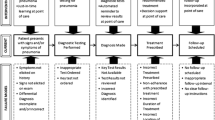Abstract
This introduction summarizes the legacy of Florence Nightingale’s important work as a leader of nursing on modern day nursing, evidence-based practice, and health care administration. The relevance of Florence Nightingale’s teachings to the care of children and adults with pediatric heart disease is highlighted.
Access provided by Autonomous University of Puebla. Download chapter PDF
Similar content being viewed by others
Keywords
Were there none who were discontented with what they have, the world would never reach anything better. —Florence Nightingale
Florence Nightingale, a celebrated British reformer, statistician, and the founder of modern nursing, is credited as being the first clinician (nurse) and epidemiologist to use data to describe patient experiences and outcomes. She was a master in creating visualizations of statistics to document the experiences of soldiers during the Crimean War (Fig. 3.1). She was a pioneer of evidence-based practice in nursing. Her legend continues to guide nursing practice, including the care of children with congenital heart disease, at all levels, from direct care, to research, and administration.
Nightingale identified that more soldiers were dying in the Crimean War in 1854 from infection due to poor health care conditions, than from wounds inflicted on the battlefield. She instituted nurse-led infection control strategies that reduced mortality from 42 % to 2 %. Poor nutrition, inadequate supplies, and stress on the soldiers were cited as major contributors to poor outcomes. These same risk factors continue to contribute to patient morbidity.
Health care providers are called to practice from a sound evidence base in order to provide care of the highest value. This means that we must move beyond dogma, expert opinion, and practice driven by tradition. Instead, we must learn how to find, interpret, and use evidence and data to ground our practice in a sound, scientifically-validated base. Our policies and procedures should reflect the state of the science and set a standard of practice that promotes provision of the best and safest care available to our patients.
It is imperative that our nursing, medical, and allied health professional schools teach the skills necessary to critically evaluate evidence presented in the literature. Study design, the source of the data, inclusion and exclusion criteria, potential for bias, and the analytical approach all need to be examined with a critical lens. We must also be critical in evaluating whether the available evidence is sufficient to guide practice or whether further research is needed. Nightingale’s work was key in revolutionizing hospital data collection. She knew that rigorous research and the best and safest care depended on accurate data that could be easily transformed into information to influence care decisions.
We do not practice in isolation. We practice within systems, large and small, academic and non-academic. High quality data is equally important at the administrative level. The role of nursing leaders in administration has evolved to emphasize collaboration with physician leaders. We recognize that administration and clinicians have a singular, common purpose, delivering the best and safest care to our patients. Working together will improve our progress toward this goal.
In our current healthcare environment of decreased reimbursement and with the data that disputes that “more care is better care” [1] there has never been a more compelling need for administrative and clinical data to ground the new direction that we as healthcare leaders must navigate. Total expenditure on health continues to rise exponentially. Whenever possible, medicine based on anecdotal evidence must be replaced by fully transparent data-driven models of care with appropriate governance. Providers and administrators have the opportunity to collaborate in a focused and disciplined way to provide appropriate resources to maintain high quality care in a cost effective manner, all of which will contribute to healthcare sustainability. Florence Nightingale would have been proud to see nursing administrators present at this innovative table where tough decisions will need to be made when we have to make do with less.
In summary, the legacy of Florence Nightingale has cast its shadow on all aspects of health care delivery, not just nursing. She recognized that knowledge and skill were needed to improve public health. With great courage and determination she single-handedly set about changing conditions for the injured soldiers of the Crimean War. She used data and statistics to support her efforts and gained the respect of health care providers and public policy makers worldwide. Nightingale’s greatest contribution to nursing may have been her emphasis on nursing integrity and the role of the nurse in helping patients to live their fullest regardless of the conditions they faced. In the 1880s, Nightingale wrote that it would be 100–150 years before educated, experienced nurses reached large enough numbers to change the healthcare system. We are those nurses today, we need to be leaders in both practice and administration. We must carry the legacy of Florence Nightingale forward by creating and using high-quality data, striving for evidence-based practice, and taking an active role in health care administration and public policy.
The chapters in this book will guide you in developing skills in seeking, finding, interpreting, and implementing meaningful data into evidence-based practice and administrative decision making. Optimizing the health and healing of children, adults, and families facing congenital heart disease requires the courage and determination that Nightingale modeled. We will do well to walk in her shadow.
Reference
World Health Organization. World health statistics 2013: a wealth of information on global public health. Geneva: WHO Press; 2013. Available at: http://apps.who.int/iris/bitstream/10665/82058/1/WHO_HIS_HSI_13.1_eng.pdf?ua=1&ua=1. Accessed 14 June 2014.
Author information
Authors and Affiliations
Corresponding author
Editor information
Editors and Affiliations
Rights and permissions
Copyright information
© 2015 Springer-Verlag London
About this chapter
Cite this chapter
Mussatto, K., Kessel, M. (2015). Introduction: Using Data to Drive Change and Improvement: The Legacy of Florence Nightingale. In: Barach, P., Jacobs, J., Lipshultz, S., Laussen, P. (eds) Pediatric and Congenital Cardiac Care. Springer, London. https://doi.org/10.1007/978-1-4471-6587-3_3
Download citation
DOI: https://doi.org/10.1007/978-1-4471-6587-3_3
Published:
Publisher Name: Springer, London
Print ISBN: 978-1-4471-6586-6
Online ISBN: 978-1-4471-6587-3
eBook Packages: MedicineMedicine (R0)





